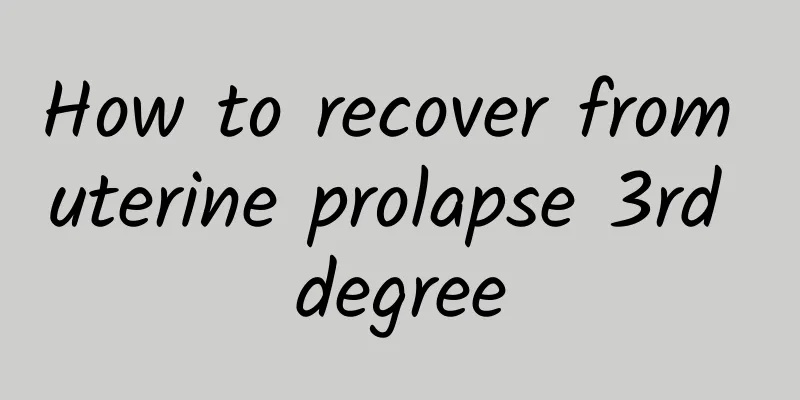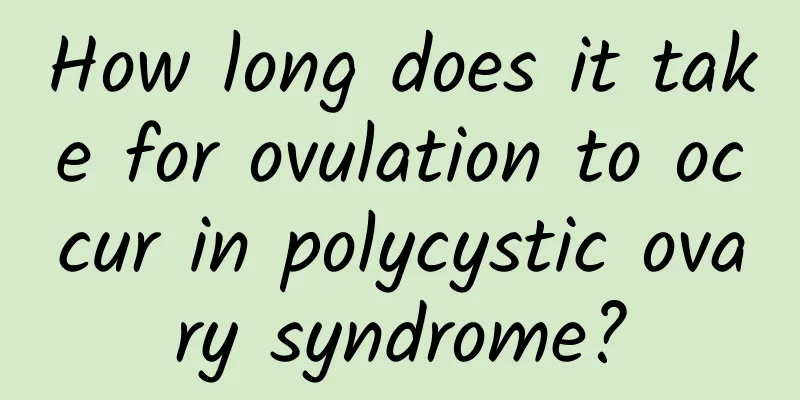How to recover from uterine prolapse 3rd degree

|
How to recover from 3rd degree uterine prolapse? Uterine prolapse is a common gynecological disease in women, mostly occurring in menopausal and elderly women. Patients with mild uterine prolapse generally have no clinical symptoms and will not cause much harm to the patient, but if the uterine prolapse reaches the third degree, it is relatively serious, and the entire uterus and cervix have been separated from the vaginal opening, causing greater harm to women. 1. Surgery to strengthen the pelvic fascia support This surgery is for young patients with no pathological changes in the cervix. It effectively improves symptoms by repairing the anterior and posterior walls of the vagina, such as anterior and posterior vaginal wall repair, ligament suspension surgery, partial cervical resection, and shortening of the main ligament. However, during the treatment, patients need to pay attention to personal hygiene to avoid infection that worsens the condition. The possibility of recurrence in the anterior and posterior vaginal wall repair surgery is relatively high. 2. Vaginal closure is a surgery mainly for the elderly who have no requirements for sex life and cannot tolerate larger surgeries. Then combined with various internal diseases, it will cause more bleeding and larger wounds. If it is not recommended for young patients, this surgery will cause loss of sexual function. 3. Total hysterectomy is a treatment for very serious patients, such as uterine prolapse accompanied by cervical hyperplasia, and more serious functional bleeding symptoms. Patients are usually recommended to use this treatment method, but they still need to pay attention to personal hygiene after treatment to avoid infection. Uterine prolapse of degree 3 is very serious, and will affect the patient's vulvar ulcers, increased secretions and bleeding. At the same time, there will be friction pain when walking, a significant sense of lower abdomen, and lumbar pain after labor. Once uterine prolapse occurs, it needs timely treatment. If it is early stage 1 of uterine prolapse, surgical treatment is not required, and it can be restored to normal through pelvic floor function training treatment. |
<<: Symptoms of pelvic inflammatory disease and cervicitis
>>: Can ovarian cysts cause abdominal pain?
Recommend
A brief discussion on the dietary considerations for multiple uterine fibroids
According to recent surveys and studies, the numb...
What are the symptoms of ectopic pregnancy in women?
Ectopic pregnancy is one of the gynecological acu...
How to treat premature ovarian failure?
As for the question of whether premature ovarian ...
Excessive visceral fat increases the risk of diabetes! Rumor has it online: Can eating more kelp sprouts and green tea eliminate visceral fat?
Are you afraid of fat? In fact, not all fat is ev...
What medicine can women take to cure cervicitis? Revealing the effective treatment of cervicitis in women
All women will suffer from cervicitis. Cervicitis...
People need to pay more attention to the causes of ovarian cysts
In recent years, with the improvement of living s...
Tell you when is the best time for abortion
Many women choose to have an abortion due to exce...
Food promotion for children will be restricted in the first review of the esophageal law
The toxic starch scandal has prompted lawmakers f...
Experts comprehensively analyze the early symptoms of ectopic pregnancy.
For pregnant women, the term ectopic pregnancy is...
Will I have menstruation if I have an ectopic pregnancy? It is not a real menstruation.
Ectopic pregnancy is a rare phenomenon in life. I...
It’s easiest to give up on weight loss on the 5th day after the New Year! Nutritionist: High-fiber soy milk + squats can help you recover from uncontrolled weight loss
After eating too many "evil delicacies"...
How to stay away from endometrial tuberculosis and be a healthy woman
Endometrial tuberculosis is a common female uteri...
Is surgery for cervical erosion harmful to the body?
Surgery for cervical erosion generally does not c...
Did you run right? If you want to jog more smoothly, you must know these warm-up and cool-down exercises
Warm-up exercises Warming up is a light exercise ...
Tomatoes are not only anti-aging, they also have 4 unexpected benefits! Nutritionists teach you 3 ways to get the most out of lycopene
Tomatoes are sweet and delicious, with thin and j...









